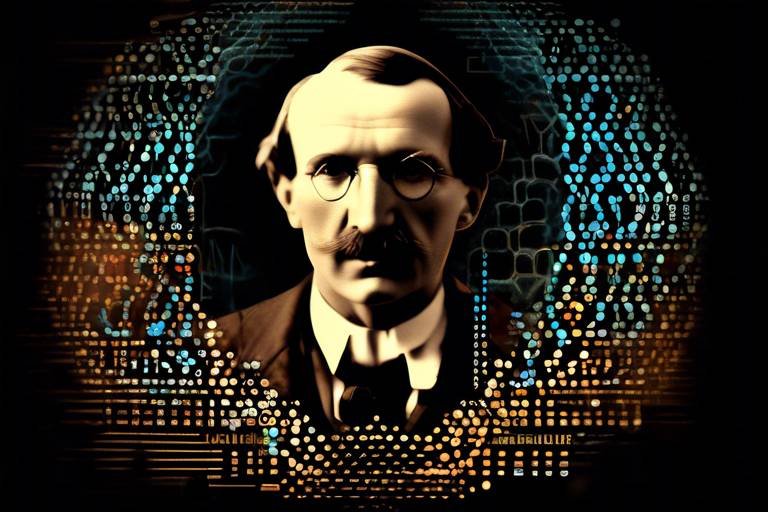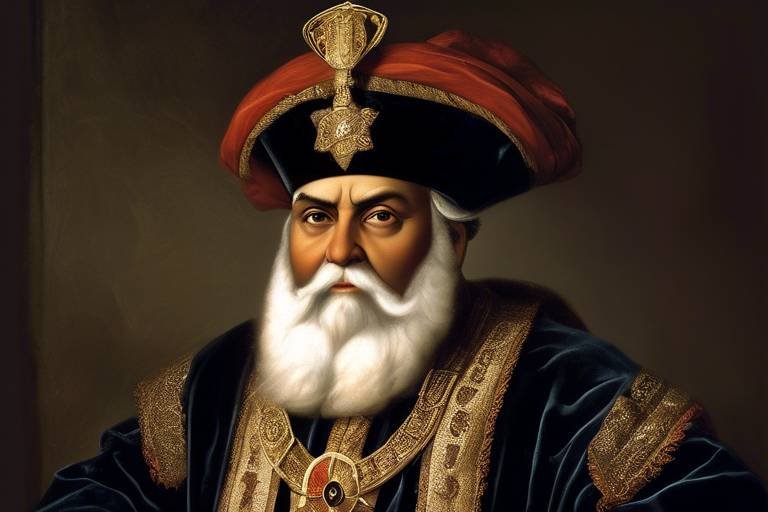Charles Darwin: The Father of Evolution
Charles Darwin, a name synonymous with evolution and natural selection, stands as a towering figure in the history of science. Born in 1809 in England, Darwin's early life was marked by a deep curiosity about the natural world, a trait that would define his future endeavors. As a young man, he embarked on a voyage that would forever alter the course of scientific thought, setting the stage for his groundbreaking contributions to the field of biology.
Darwin's seminal work, On the Origin of Species, published in 1859, sent shockwaves through the scientific community. In this revolutionary book, Darwin presented his theory of natural selection, proposing that species evolve over time through the process of adaptation and survival of the fittest. This concept challenged the prevailing beliefs of the time and laid the foundation for modern evolutionary biology.
One of Darwin's most enduring legacies is his emphasis on evidence-based research and meticulous observation. His scientific methodology, characterized by rigorous data collection and analysis, continues to serve as a model for researchers across various disciplines. Darwin's approach revolutionized the study of evolution, paving the way for a deeper understanding of the mechanisms driving biodiversity and the interconnectedness of all living beings.
Today, Darwin's influence extends far beyond the realm of biology. His ideas have permeated fields such as anthropology, psychology, and even philosophy, shaping our understanding of human nature and our place in the natural world. The ongoing research in evolutionary biology builds upon Darwin's work, pushing the boundaries of our knowledge and challenging us to rethink our relationship with the environment and other species.
Despite his enduring legacy, Darwin's theories have not been without controversy. Debates over evolution, creationism, and intelligent design continue to spark heated discussions among scholars and the general public. The ongoing relevance of Darwin's work underscores the profound impact he has had on our understanding of the natural world and the processes that govern life on Earth.
In conclusion, Charles Darwin's contributions to science are nothing short of revolutionary. His theory of evolution by natural selection has fundamentally transformed our understanding of life on Earth, inspiring generations of scientists to explore the intricate web of relationships that bind all living organisms. Darwin's legacy as the father of evolution endures, a testament to the power of curiosity, observation, and the relentless pursuit of knowledge.

Early Life and Education
Charles Darwin, a renowned naturalist, is celebrated for his groundbreaking work on evolution that revolutionized the field of biology. His contributions continue to shape scientific thought and research, leaving a lasting impact on the understanding of the natural world.
Charles Robert Darwin was born on February 12, 1809, in Shrewsbury, England, into a family with a strong interest in science and medicine. His father, Robert Darwin, was a successful physician, and his grandfather, Erasmus Darwin, was a prominent naturalist and poet. Growing up in this intellectually stimulating environment, young Charles developed a keen curiosity for the natural world.
Despite initially studying medicine at the University of Edinburgh, Darwin's true passion lay in natural history. He later transferred to Christ's College, Cambridge, where he pursued his interest in geology and biology. It was during his time at Cambridge that Darwin's fascination with the diversity of plant and animal species deepened, setting the stage for his future exploration of evolution.
One of the pivotal moments in Darwin's early life was his encounter with the works of Alexander von Humboldt, a renowned naturalist and explorer. Humboldt's scientific expeditions and observations inspired Darwin to embark on his own journey of discovery, shaping his future endeavors in the field of natural history.
Through his upbringing, education, and exposure to influential figures in the scientific community, Darwin's early life laid the foundation for his remarkable contributions to the theory of evolution.
- What was Charles Darwin's most famous work?
- How did Darwin's upbringing influence his interest in natural history?
- What inspired Darwin to explore the theory of evolution?
- What impact did Darwin's theory of natural selection have on the scientific community?
- How does Darwin's legacy continue to shape modern biology?

Voyage on the HMS Beagle
Charles Darwin, a renowned naturalist, stands as a monumental figure in the realm of biology, credited as the pioneer of the theory of evolution. His groundbreaking work continues to shape scientific discourse and exploration to this day.
Exploring Darwin's formative years unveils a young mind brimming with curiosity and a thirst for knowledge. His upbringing, education, and early influences all played a crucial role in nurturing his fascination with the natural world, setting the stage for his revolutionary theories on evolution.
Embarking on the HMS Beagle marked a turning point in Darwin's life, propelling him towards a voyage that would forever alter the course of scientific history. As he traversed the globe, meticulously documenting the flora and fauna he encountered, Darwin laid the groundwork for his theory of natural selection, drawing inspiration from the diverse ecosystems he observed.
Darwin's magnum opus, On the Origin of Species, sent shockwaves through the scientific community, challenging established beliefs and igniting passionate debates on the origins of life. His eloquent arguments and meticulous observations paved the way for a new understanding of the interconnectedness of all living beings.
Central to Darwin's evolutionary framework is the concept of natural selection, a mechanism through which species adapt and evolve over time in response to their environment. This principle of "survival of the fittest" underscores the intricate web of life, showcasing nature's relentless drive for adaptation and diversity.
Darwin's legacy looms large in the field of biology, his theories serving as a cornerstone of modern evolutionary thought. Yet, his work has not been without its controversies, sparking debates on creationism, intelligent design, and the boundaries between science and belief.
Delving into the realm of human evolution, Darwin's influence reverberates through the study of our species' origins and development. By tracing the genetic threads that connect us to our primate ancestors, evolutionary biologists continue to unravel the mysteries of our shared past.
At the heart of Darwin's scientific endeavors lies a meticulous methodology characterized by keen observation, rigorous experimentation, and a relentless pursuit of empirical evidence. His systematic approach to research laid a solid foundation for the field of evolutionary biology, emphasizing the importance of data-driven analysis and critical thinking.
The legacy of Darwin lives on in the vibrant landscape of evolutionary biology, where researchers build upon his work to deepen our understanding of the natural world. By exploring the intricacies of genetic variation, ecological interactions, and species diversity, scientists continue to unravel the tapestry of life on Earth.

The Origin of Species
Charles Darwin's groundbreaking work, On the Origin of Species, published in 1859, marks a pivotal moment in the history of science. In this seminal book, Darwin presented his theory of evolution through natural selection, challenging the prevailing beliefs of his time and forever altering our understanding of the natural world.
Darwin's central argument in On the Origin of Species revolves around the concept of natural selection as the mechanism driving the evolution of species over time. He proposed that within a population, individuals with advantageous traits that better suit them to their environment are more likely to survive and reproduce, passing on these beneficial traits to their offspring. This process, repeated over generations, leads to the gradual change and diversification of species.
Through meticulous observations of various species and environments during his travels, Darwin accumulated a wealth of evidence supporting his theory. He highlighted the importance of adaptation and the struggle for existence in shaping the diversity of life on Earth. Darwin's theory of natural selection provided a unifying explanation for the patterns of diversity and complexity observed in the natural world.
On the Origin of Species sparked intense debates within the scientific community and beyond, challenging deeply held religious and philosophical beliefs about the origins of life. Darwin's work forced a reevaluation of humanity's place in the natural world and laid the foundation for modern evolutionary biology.

On the Origin of Species,
Exploring the life and contributions of Charles Darwin, a renowned naturalist whose work on evolution revolutionized the field of biology and continues to influence scientific thought and research to this day.
Discovering Darwin's upbringing, education, and early influences that shaped his interest in natural history and laid the foundation for his groundbreaking theories on evolution.
Examining Darwin's transformative journey aboard the HMS Beagle, where he gathered the observations and evidence that would later form the basis of his theory of natural selection.
Delving into Darwin's seminal work, On the Origin of Species, and its profound impact on the scientific community, challenging prevailing beliefs and sparking debates on the origin of life.
Explaining the concept of natural selection, a key principle in Darwin's theory of evolution, and its role in shaping the diversity of life forms through the process of adaptation and survival of the fittest.
Reflecting on Darwin's enduring legacy in modern biology and the controversies surrounding his work, including debates on creationism, intelligent design, and the ongoing relevance of evolutionary theory.
Investigating Darwin's influence on the study of human evolution and anthropology, including the evolutionary history of Homo sapiens and the genetic connections between modern humans and our primate ancestors.
Analyzing Darwin's scientific methodology and approach to research, including his meticulous observations, experiments, and synthesis of data to support his evolutionary theories.
Exploring the current state of evolutionary biology and the ongoing research that builds upon Darwin's work, expanding our understanding of evolution and its implications for biodiversity and the natural world.
Charles Darwin's groundbreaking work, On the Origin of Species, published in 1859, presented his theory of evolution through natural selection. In this seminal book, Darwin detailed how species evolve over time through the process of natural selection, where organisms best adapted to their environment are more likely to survive and reproduce, passing on their advantageous traits to future generations. The book challenged the prevailing belief in special creation and provided a comprehensive explanation for the diversity of life on Earth.

and its profound impact on the scientific community, challenging prevailing beliefs and sparking debates on the origin of life.
Charles Darwin's seminal work, On the Origin of Species, had a profound impact on the scientific community, challenging prevailing beliefs and sparking debates on the origin of life. Darwin's theory of evolution through natural selection revolutionized the field of biology by proposing a mechanism for how species evolve over time. By suggesting that all organisms are descended from a common ancestor and that the diversity of life arises through the process of natural selection, Darwin's ideas shook the foundations of traditional views on creation and the nature of species.

Natural Selection and Evolution
Charles Darwin, a renowned naturalist, is celebrated for his groundbreaking work on evolution that has left an indelible mark on the field of biology. His contributions continue to shape scientific thought and research to this day.
Exploring Darwin's upbringing, education, and early influences reveals the roots of his fascination with natural history. These formative experiences laid the groundwork for his revolutionary theories on evolution.
Darwin's transformative journey aboard the HMS Beagle was a pivotal moment in his life. During this expedition, he meticulously collected observations and evidence that would later serve as the foundation for his theory of natural selection.
Delving into Darwin's seminal work, On the Origin of Species, unveils the profound impact it had on the scientific community. By challenging prevailing beliefs, Darwin's work ignited debates on the origin of life and fundamentally altered our understanding of the natural world.
Central to Darwin's theory of evolution is the concept of natural selection. This principle underscores the idea that organisms best adapted to their environment are more likely to survive and pass on their advantageous traits to future generations. Through this process of adaptation and the survival of the fittest, the diversity of life forms is shaped over time.
Darwin's legacy in modern biology is undeniable, yet his work continues to spark controversies. Debates on creationism, intelligent design, and the ongoing relevance of evolutionary theory persist, highlighting the enduring impact of Darwin's ideas.
Darwin's influence on the study of human evolution and anthropology is profound. His research into the evolutionary history of Homo sapiens and the genetic connections between modern humans and our primate ancestors has reshaped our understanding of our place in the natural world.
Analyzing Darwin's scientific approach reveals his meticulous observations, experiments, and data synthesis. His rigorous methodology supported his evolutionary theories and exemplified the importance of empirical evidence in scientific inquiry.
Exploring the current landscape of evolutionary biology showcases the ongoing research that builds upon Darwin's foundational work. Scientists continue to expand our knowledge of evolution, biodiversity, and the interconnectedness of all living organisms.

Legacy and Controversies
Charles Darwin, a renowned naturalist, is often hailed as the father of evolution for his groundbreaking work that revolutionized the field of biology. His contributions continue to shape scientific thought and research to this day.
Reflecting on Darwin's enduring legacy in modern biology, it is impossible to overlook the controversies that have surrounded his work. While his theory of evolution through natural selection has been widely accepted and forms the foundation of modern biology, it has also sparked debates and opposition.
Darwin's ideas challenged prevailing beliefs about the origin of life and the diversity of species, leading to controversies with religious authorities and proponents of creationism. The concept of evolution by natural selection clashed with the notion of divine creation, igniting debates on the compatibility of science and religion.
Despite the scientific community largely embracing Darwin's theories, controversies persist in certain circles. The ongoing debates on creationism, intelligent design, and the teaching of evolution in schools highlight the enduring relevance of Darwin's work and the challenges it poses to established beliefs.
Moreover, Darwin's legacy extends beyond the realm of biology to influence various fields, including philosophy, ethics, and anthropology. His ideas have sparked discussions on human nature, morality, and the interconnectedness of all living beings, leaving a profound impact on intellectual discourse.
While controversies continue to surround Darwin's work, his legacy as the father of evolution remains undisputed, shaping our understanding of the natural world and our place within it.
Stay tuned for answers to common questions about Charles Darwin, his theory of evolution, and its impact on modern science.

Human Evolution and Anthropology
Exploring the life and contributions of Charles Darwin, a renowned naturalist whose work on evolution revolutionized the field of biology and continues to influence scientific thought and research to this day.
Charles Darwin's impact on the study of human evolution and anthropology is profound. His theory of evolution by natural selection not only transformed our understanding of the natural world but also provided a framework for investigating the evolutionary history of Homo sapiens.
Darwin's work laid the groundwork for exploring the genetic connections between modern humans and our primate ancestors. By emphasizing the continuity of life forms and the concept of a shared ancestry, he challenged traditional views of human origins and sparked new avenues of research in anthropology.
Through comparative anatomy, fossil records, and genetic studies, scientists have been able to trace the evolutionary lineage of humans back to common ancestors with other primates. This evolutionary perspective has enriched our understanding of human diversity, adaptation, and cultural development over millennia.
Furthermore, Darwin's insights into the mechanisms of natural selection have provided a powerful explanatory framework for the adaptations and variations observed in human populations worldwide. By studying the selective pressures that have shaped human traits and behaviors, researchers continue to uncover fascinating insights into our evolutionary past and present.
In essence, Darwin's contributions to human evolution and anthropology have not only reshaped our understanding of where we come from but also highlighted the interconnectedness of all living beings on Earth, emphasizing our shared evolutionary heritage.
Q: What was Charles Darwin's most famous work?
A: Charles Darwin's most famous work is On the Origin of Species, where he introduced his theory of evolution by natural selection.
Q: How did Darwin's theory of evolution impact scientific thought?
A: Darwin's theory of evolution revolutionized biology by providing a unifying explanation for the diversity of life on Earth and the mechanisms driving evolutionary change.
Q: What controversies surround Darwin's work?
A: Darwin's theory of evolution has sparked debates on creationism, intelligent design, and the implications of evolutionary theory for understanding the natural world and human origins.
Q: How has Darwin's legacy influenced modern biology?
A: Darwin's legacy continues to shape the field of biology, inspiring ongoing research in evolutionary biology, genetics, and the study of biodiversity.

Darwin's Scientific Methodology
Charles Darwin, a renowned naturalist, is widely regarded as the father of evolution. His groundbreaking work revolutionized the field of biology and continues to shape scientific thought and research to this day.
Charles Darwin's scientific methodology was characterized by meticulous observations, rigorous experiments, and a systematic approach to data analysis. He carefully documented the diversity of species, their adaptations to different environments, and the patterns of natural selection at work.
Darwin's methodology involved conducting extensive fieldwork during his voyage on the HMS Beagle, collecting specimens and data that would later form the basis of his evolutionary theories. He spent years observing and studying various species, noting their similarities, differences, and the environmental factors influencing their survival.
Through his methodical approach, Darwin was able to synthesize a wealth of information into his seminal work, "On the Origin of Species." This book presented a comprehensive theory of evolution through natural selection, supported by a wealth of empirical evidence gathered through years of research and analysis.
Moreover, Darwin's scientific methodology emphasized the importance of peer review and collaboration within the scientific community. He engaged in extensive correspondence with fellow naturalists, sharing his findings and seeking feedback to refine his ideas and strengthen his arguments.
Overall, Darwin's scientific methodology exemplified the principles of empirical observation, hypothesis testing, and evidence-based reasoning, laying the foundation for modern evolutionary biology and shaping the way we understand the natural world.
- What was Charles Darwin's most famous work?
Charles Darwin's most famous work is "On the Origin of Species," where he introduced his theory of evolution through natural selection. - How did Darwin's theory of evolution impact scientific thought?
Darwin's theory of evolution revolutionized biology by providing a comprehensive explanation for the diversity of life on Earth and the mechanisms driving species change over time. - What are some controversies surrounding Darwin's work?
Darwin's theory of evolution has sparked debates on creationism, intelligent design, and the compatibility of evolutionary theory with religious beliefs. - What is the relevance of Darwin's scientific methodology today?
Darwin's scientific methodology, emphasizing empirical evidence and rigorous analysis, continues to influence modern scientific research practices and the development of evolutionary theory.

Evolutionary Biology Today
Charles Darwin, a name synonymous with evolution, stands as a towering figure in the realm of natural sciences. His pioneering work on evolution has not only reshaped the landscape of biology but has also left an indelible mark on scientific inquiry and understanding. Let's delve into the life and contributions of this remarkable naturalist and explore the enduring legacy he has bestowed upon the scientific community.
In the contemporary scientific landscape, evolutionary biology stands as a vibrant and dynamic field that continues to expand and evolve. Building upon the foundations laid by Darwin, modern researchers delve into the intricacies of genetic mechanisms, ecological interactions, and evolutionary processes that shape the diversity of life on Earth.
Through advanced technologies and interdisciplinary collaborations, scientists today unravel the complexities of evolutionary patterns, from the molecular level to the ecosystem level. The study of evolutionary biology not only sheds light on the origins and relationships of different species but also informs conservation efforts and guides our understanding of the interconnectedness of all living organisms.
Moreover, the field of evolutionary biology serves as a bridge between the past and the future, offering insights into how life has adapted and diversified over millions of years and how it may continue to change in response to environmental challenges. By studying the mechanisms of evolution, researchers aim to decipher the fundamental principles that govern life's diversity and resilience.
As we peer into the intricate tapestry of life on Earth, guided by the principles of natural selection and genetic variation, we gain a deeper appreciation for the beauty and complexity of the evolutionary process. Evolutionary biology today stands at the forefront of scientific discovery, unraveling the mysteries of life's past, present, and future.
- What was Charles Darwin's most significant contribution to science?
- How has Darwin's theory of evolution influenced modern biology?
- What are some common misconceptions about evolutionary theory?
- What role does natural selection play in shaping the diversity of life forms?
- How does evolutionary biology contribute to our understanding of biodiversity and conservation?
Frequently Asked Questions
- What is Charles Darwin best known for?
Charles Darwin is best known for his theory of evolution by natural selection, which revolutionized the field of biology and our understanding of the origin of species.
- How did Darwin develop his theory of evolution?
Darwin developed his theory of evolution through years of observation, research, and analysis of various species, culminating in his groundbreaking work, "On the Origin of Species."
- What is natural selection?
Natural selection is the process by which organisms better adapted to their environment tend to survive and reproduce more successfully, leading to the gradual evolution of species over time.
- What controversies surround Darwin's work?
Darwin's work has sparked debates on topics such as creationism, intelligent design, and the conflict between evolutionary theory and religious beliefs.
- How has Darwin's legacy influenced modern biology?
Darwin's legacy continues to shape modern biology by providing a foundation for understanding biodiversity, genetic relationships, and the mechanisms of evolution in living organisms.



















